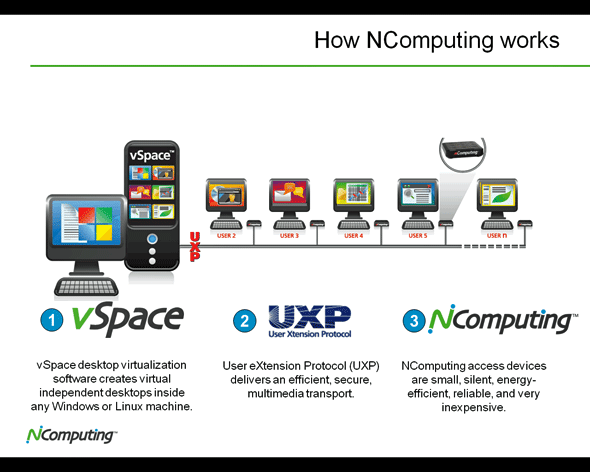While VMware and Citrix get most of the attention when it comes to desktop virtualization, it turns out that probably the biggest industry leader in terms of actual deployment just might be NComputing.
With over 2 million clients deployed, NComputing is quietly becoming a force to be reckoned with using a thin client approach that virtualizes desktops with no real perceptual degradation in the user experience. To accomplish this, NCcomputing developed a technology called vSpace that resides on a server and communicates with clients linked to the server using a connector that communicates over a proprietary User eXtension Protocol (UXP) that NComputing developed.
vSpace is an alternative to traditional virtual server implementations in that it can be used on either a regular server or a desktop PC to create partitions on that machine for each user attached. The UXP technology is an alternative to both VMware and Citrix protocols that NComputing claims is a lot more efficient in terms of sharing the desktop presentation with thin clients at a cost of about $70 per client.
NComputing CEO Stephen Dukker says the company will expand on that vision in 2010 with both a software-only approach that will allow devices such as a PC to connect to vSpace and a separate implementation on a chip that manufacturers can use to embed NComputing support into any number of environments, such as digital televisions.
NComputing recently received a vote of confidence in the form of an alliance with Microsoft, even though Microsoft has also recently moved to roll out a similar low-end approach to vSpace called the Windows Multipoint Server 2010.
Right now, NComputing is finding most of its success in emerging markets such as India and the education sector where cost-sensitivity is high. But Dukker expects to see Internet service providers (ISPs) giving away thin clients such as NComputing’s devices as part of an inexpensive approach towards driving more Internet traffic on their networks.
The issue that NComputing is driving hard at is that most other alternatives to desktop virtualization not only compromise the end user PC experience in some way, they also raise the overall costs of enterprise computing when you factor in their network infrastructure and server storage costs compared to a traditional PC. In comparison, NComputing is promising customers that they can maintain existing PC application fidelity, scale more linearly and dramatically cut costs.
It may take a while for all the in-fighting over desktop virtualization to play out, but right now it looks like NComputing may very well surprise everybody at the finish line.



